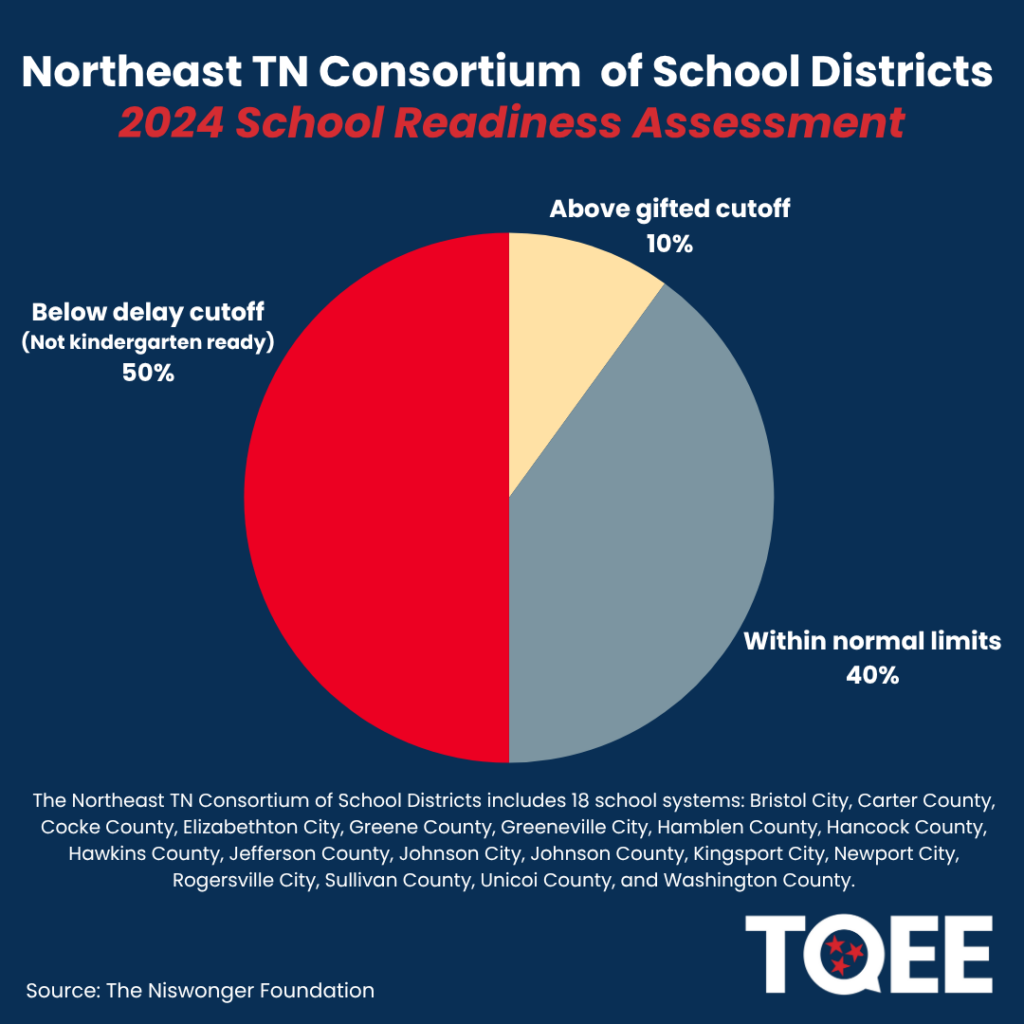The Challenge
Tennessee, like the rest of the nation, is experiencing a shortage of early educators in child care, preschool and K-3rd classrooms. High school career and technical education (CTE) programs for Early Childhood Education Careers (ECCE) and Teaching as a Profession (TAP) are potentially productive “on-ramps” for the early educator workforce pipeline. However, the programs largely aren’t reaching their promise as such.
But one group of innovators in West Tennessee has figured out how to creatively assemble the many puzzle pieces of resources and educational requirements and BINGO, Tennessee has a model to emulate!
TQEE was recently able to interview two of the model’s masterminds, Kelly Maupin, TECTA Director at Dyersburg State Community College and Patty Sharp, Coordinator of Early Childhood Education at Dyersburg State Community College, to learn more about the nuts and bolts of how it all works. Check out the video interview here.
The Solution: Dyersburg State Community College + TECTA + 30 (and growing) West TN High Schools
In a nutshell:
Dyersburg State Community College (DSCC), in collaboration with the Tennessee Early Childhood Training Alliance (TECTA), has developed a solution to help students at 30 (and counting!) area high schools obtain their Child Development Associate (CDA) – a key early childhood industry credential – while scoring community college course credits. Graduates with a CDA can get a job at most childcare or Head Start programs, or as a Teacher Assistant in a Voluntary Preschool classroom with their school district.
Here’s how it works:
Creating the DSCC / high school partnerships. Kelly Maupin and Patty Sharp proactively reach out to key leaders at area high schools (e.g. principals, CTE program leaders) to introduce their program; and, importantly, they customize the program to meet the particular needs of a given high school.
Program design. The program has some consistent elements across all participating high schools:
- TECTA Orientation Online: Typically during freshman or sophomore year, students participate in 10 three-hour early childhood training modules covering topics such as developmentally appropriate practice. The course is no-cost to the students (or the high school), and upon completion students earn a “certificate” and, importantly, unlock eligibility for TECTA-funded post-secondary scholarships and support to attain a CDA.
- Career and Technical Education Courses: Next, typically during their junior and senior years, students enroll in Early Childhood Education Careers (ECCE) or Teaching as a Profession (TAP) while also being dual enrolled at DSCC for 4 online courses (12 college credit hours). These online courses are asynchronous – meaning students can login on their own time and don’t require the participation of a teacher. Most students do the online coursework in groups during the school day, monitored by a teacher or administrator; but others get the coursework accomplished unsupervised in study hall or after school. All of these students are actively supported by Patty or her recently hired second early childhood instructor at DSCC both of whom monitor student progress, provide feedback and encouragement, answer questions and ultimately grade the work.
- For the ECCE track, the 4 courses are the same as those required for completion of the CTE program, therefore completely eliminating the need for a qualified instructor at the high school.
- For the TAP track, the 4 online courses can satisfy some of the TAP coursework. Often the classroom instructor at the high school will use part of the week to cover TAP-specific material. Therefore, the courseload tends to be heavier for students in the TAP track.
- Practicum/Work-based Learning (WBL): As part of the high school CTE requirement (both ECCE and TAP tracks), a practicum/work-based learning (WBL) must be completed. Likewise, to obtain a CDA credential, students must have participated in 480 hours of supervised work experience working with children in the age group matching their area of concentration/category of CDA application (e.g. infants, toddlers, 4 year old, K-3rd). During this period they must create a professional portfolio which they do with guidance from Patty / their DSCC instructor. The practicum is typically conducted at a child care or preschool facility offsite where students work on weekends, summers and/or after-school, or in some cases during the school day. Students may be paid depending on the provider-host, though typically they are volunteer helpers and do not count towards the provider’s staff:child ratio requirement. Kelly and her TECTA team at DSCC establish the partnerships with local providers and make arrangements for student WBL placement, as well as provide a TECTA coach for each student.
- CDA Application: To attain a CDA credential, students must complete an application with the Council of State Recognition and receive a “verification visit” or observation of them at work with children during their practicum. Kelly and her TECTA team at DSCC support the students every step of the way – they guide them in the application process, pay the $425 application fee, and conduct the verification visit.
Student Recruitment: Kelly and her TECTA team are proactive around student recruitment into the programs for each high school. They attend school and community-sponsored career fairs and events, 8th grade parent nights, and host on-site information sessions at the schools. They also connect with school guidance counsellors and CTE program staff to make them aware of and distribute materials on the program.
Graduation / Post Secondary: In an ideal ECE career pathway model, once students graduate they enroll in an ECE associate degree program at DSCC having already completed 12 hours of college credit through the dual enrolment program. And some may enroll in a four year college with an Educator Prep Program. Graduates with CDAs are also well positioned to immediately be employed by child care and preschool programs including at their own school district’s VPK classrooms as teacher assistants. While not all students opt to pursue early education as a career field, even those deciding to pursue a different path benefit from having the dual enrolment credits, the CDA credential, and the child development knowledge which may later benefit them as parents.
Financing the Model: TECTA is funded by TN Department of Human Services with federal CCDF funding. These TECTA dollars pay for the 30 hour orientation, all of the CDA related costs, and all of the program support work provided by Kelly and her team as funding allows. They also can fund all of the coursework toward an ECE associate degree program at a TN community college and can contribute a significant amount toward bachelor’s degree coursework in an ECE degree program. Federal financial aid and TN Promise scholarships also can pay for associate degree programs in TN. As for the 4 dual enrolment courses administered by Patty and her team during the high school CTE program, payment is provided to DSCC by the high school using funds available through a state of TN Dual Enrollment Grant.
The Results: Since fall of 2022, 207 high school students have taken at least 1 of the CDA dual enrollment courses. To date, 519 students have completed the TECTA orientation. At the end of the 2023-24 school year 9 students graduated with their CDA, 2 are waiting on results and 2 have applied! High School students enroll in the CDA dual enrolment courses with many potential professions in mind. Some students are interested in working in a pre-k classroom, doing home visits, or being a teaching assistant. Other students have goals of being a licensed teacher, a pediatrician or pediatric nurse, a social worker, and beyond. The coursework for the CDA can provide lessons that are applicable to many areas of life.
The Secret Sauce: Kelly and Patty together are the “secret sauce”, the driving force that makes all of this come together.
Kelly and her team are dedicated and energized in building partnerships with high schools and recruiting students into the program. They also “make it happen” with the work-based learning placements and obtaining the CDA. On the instructional side, Patty is dedicated to helping the students in her courses succeed. She moderates their workload and keeps each student informed of what steps they need to take to succeed. Patty shared that it can be challenging to have high school students take part in college level classes, as the classes are rigorous and require time and attention and says that her motivational mantra is…Be flexible, be persistent, and just do the work!
Through their innovation, dedication and teamwork, Patty and Kelly are successfully assembling all of the puzzle pieces that together can help ensure Tennessee’s high school CTE programs are on-ramps for our state’s early educator workforce pipeline!
About TECTA
TECTA is a statewide system designed to offer affordable professional development with academic degree credit possibilities for Tennessee’s early childhood educators. TECTA’s central offices are at Tennessee State University with satellite offices located at four community colleges and 4 universities across the state, all funded by the TN Department of Human Services with federal CCDF dollars. TECTA’s mission is to nurture the growth of early childhood professionals, resulting in high-quality early childhood experiences for all of Tennessee’s children. By providing comprehensive training and support, TECTA helps educators enhance their skills, advance their careers, and ultimately improve the quality of care and education provided to young children across the state. The TECTA site at Dyersburg State Community College serves most all of West TN, other than Shelby and Fayette Counties.
TECTA at Dyersburg State Community College
About Dyersburg State Community College
Dyersburg State Community College (DSCC) is a public community college located in Dyersburg, Tennessee, serving nine counties in West Tennessee, including Crockett, Dyer, Haywood, Henry, Lake, Lauderdale, Obion, Tipton, and Weakley. Established in 1969, DSCC offers a range of academic programs designed to meet the diverse needs of its students. DSCC provides a variety of educational opportunities including: Associates Degrees, Technical and Academic Certificates, and Honors and International Studies Programs.
In addition to the orientation provided by TECTA and the dual enrolment CDA coursework for high schools; DSCC offers the following Early Childhood credential programs:
- Basic Early Childhood Education Certificate (12 Credit Hours — Same 4 courses as dual enrolment for high schoolers)
- Early Childhood Education Certificate (24 Credit Hours)
- Early Childhood Administrator Certificate
- Early Childhood Infant Toddler Child Certificate
- Early Childhood Education, A.A.S.
- Early Childhood Education PreK-3 Emphasis (Tennessee Transfer Pathway) A.S.T.





